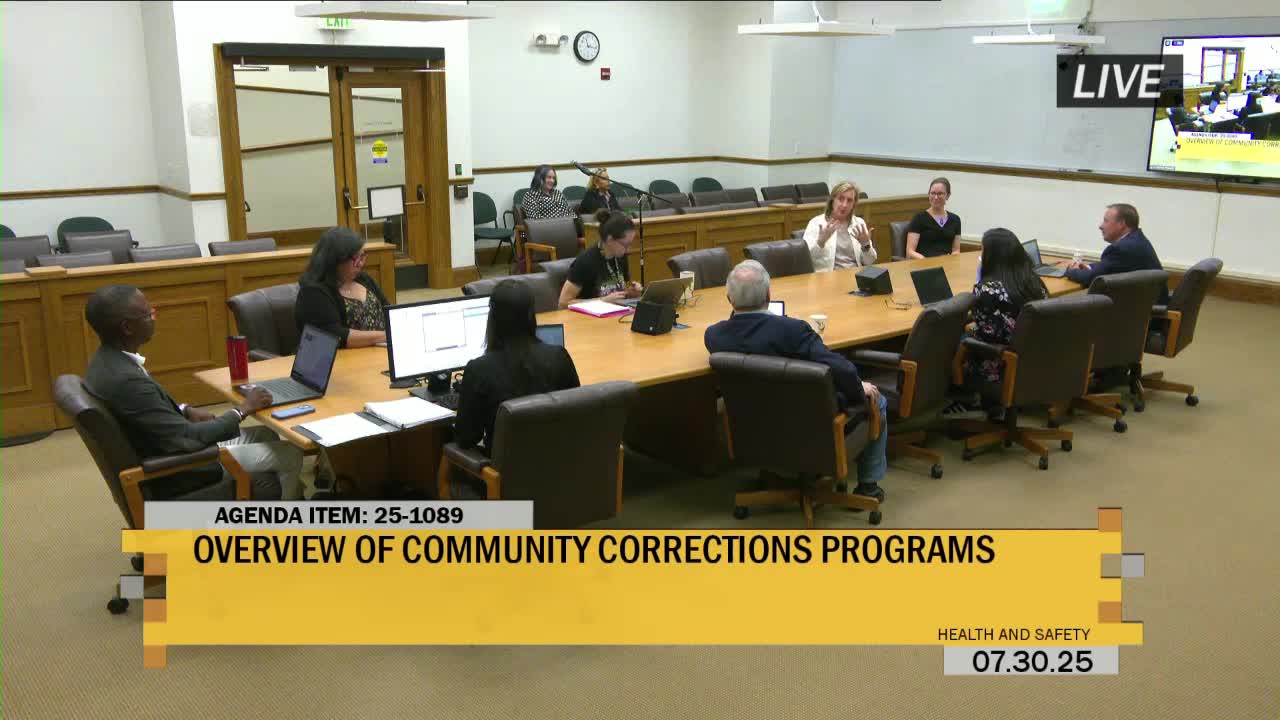Denver Community Corrections Board Discusses Demographics and Electronic Monitoring Impact
July 30, 2025 | Denver (Consolidated County and City), Colorado
This article was created by AI summarizing key points discussed. AI makes mistakes, so for full details and context, please refer to the video of the full meeting. Please report any errors so we can fix them. Report an error »

The Denver City Health and Safety meeting held on July 30, 2025, focused on several key issues regarding community corrections and electronic monitoring systems. The meeting began with Council Member Flynn expressing appreciation for the ongoing discussions about increasing residential beds for community corrections, highlighting the importance of accessible support for individuals transitioning from incarceration.
Council Member Gonzalez Gutierrez raised inquiries about the composition of the community corrections board, specifically the breakdown of the ten positions representing criminal justice and human services. The response clarified that the board includes representatives from the district attorney's office, the public defender's office, the Denver sheriff's department, and probation officers, among others. The discussion emphasized the need for transparency regarding the roles of these representatives and their impact on community corrections.
Further, Gonzalez Gutierrez requested demographic comparisons between the general population and those incarcerated, aiming to identify any disparities in access to lower-level supervision programs. The response indicated that data from the sheriff's department revealed significant overrepresentation of people of color in the criminal justice system compared to the general population, a concern that will be addressed in future reports.
Council Member Paradis revisited the topic of electronic monitoring, inquiring about a study assessing its effectiveness. The discussion revealed ongoing research in collaboration with Arizona State University, focusing on the impact of GPS monitoring on pretrial populations. Preliminary findings suggested that GPS monitoring does not correlate with an increase in new crimes, although further analysis is needed to understand its overall effectiveness.
The meeting concluded with an acknowledgment of the importance of sharing success stories from residents benefiting from community support programs. Council members expressed a desire to highlight these narratives to better illustrate the positive outcomes of the initiatives discussed.
Overall, the meeting underscored the city's commitment to addressing disparities in the criminal justice system and enhancing community support mechanisms, with plans for further data sharing and analysis in the future.
Council Member Gonzalez Gutierrez raised inquiries about the composition of the community corrections board, specifically the breakdown of the ten positions representing criminal justice and human services. The response clarified that the board includes representatives from the district attorney's office, the public defender's office, the Denver sheriff's department, and probation officers, among others. The discussion emphasized the need for transparency regarding the roles of these representatives and their impact on community corrections.
Further, Gonzalez Gutierrez requested demographic comparisons between the general population and those incarcerated, aiming to identify any disparities in access to lower-level supervision programs. The response indicated that data from the sheriff's department revealed significant overrepresentation of people of color in the criminal justice system compared to the general population, a concern that will be addressed in future reports.
Council Member Paradis revisited the topic of electronic monitoring, inquiring about a study assessing its effectiveness. The discussion revealed ongoing research in collaboration with Arizona State University, focusing on the impact of GPS monitoring on pretrial populations. Preliminary findings suggested that GPS monitoring does not correlate with an increase in new crimes, although further analysis is needed to understand its overall effectiveness.
The meeting concluded with an acknowledgment of the importance of sharing success stories from residents benefiting from community support programs. Council members expressed a desire to highlight these narratives to better illustrate the positive outcomes of the initiatives discussed.
Overall, the meeting underscored the city's commitment to addressing disparities in the criminal justice system and enhancing community support mechanisms, with plans for further data sharing and analysis in the future.
View full meeting
This article is based on a recent meeting—watch the full video and explore the complete transcript for deeper insights into the discussion.
View full meeting
